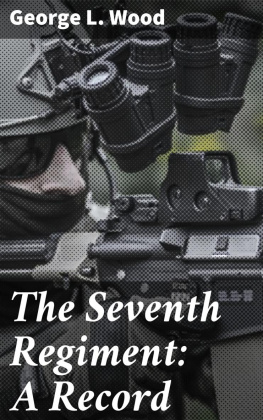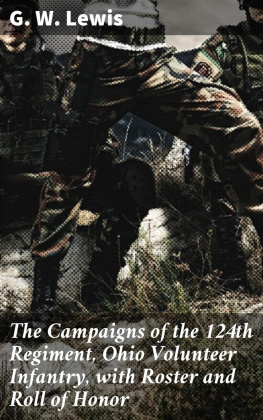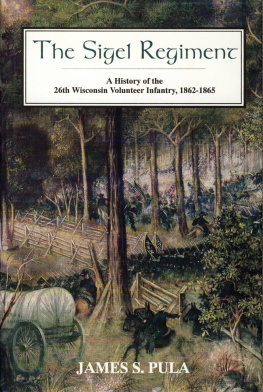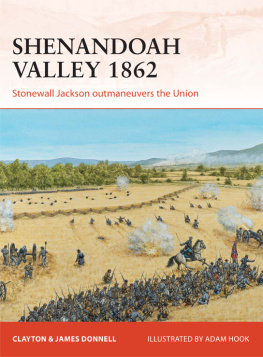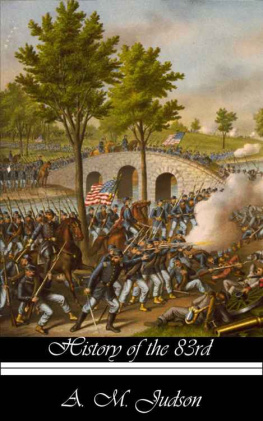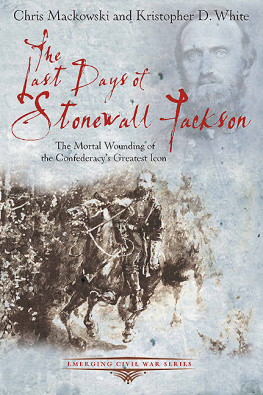James H. Wood
The War; "Stonewall" Jackson, His Campaigns and Battles, the Regiment as I Saw Them
Published by Good Press, 2019
EAN 4064066248840
PREFACE
Table of Contents
These brief memoirs of the War between the States have been written with care. More elaborate detail might have been employed but habits of a professional life have led to terseness of expression, hence the story unembellished is given, based on personal recollections aided by facts from others and such records as I have been able to reach, including Strickler's Statistics of dates of battles.
No effort has been made to do more than to give a brief account of the events seen and known directly or from sources above mentioned. This was undertaken for the purpose of leaving to comrades who still live, to the families of those who are dead, to our own families and to posterity some record, from our view-point, of the most stirring events and enactments of our lives.
To the extent of my rank I was a participant in the scenes describedexcept two battlesfrom which disability from wounds prevented. "The Regiment" creditably participated in all.
The performance of this work though unavoidably deferred, is a duty I have long since felt incumbent upon myself as well as others who can and care to do so, to give to our country the benefit of our testimony as we saw it, of the achievements, sufferings and sacrifices through which our comrades and country passed in those eventful years before the same shall fade from our memory. Our ranks are rapidly thinning and soon there will be none left to tell the tale, hence the importance of the testimony of actors who yet live. From their direct testimony truth can be reached by the future historian. It is becoming in us and we do revere the memory of our dead comrades, thousands of whom sleep in unknown graves, and their achievements and devotion to the cause they believed to be just have almost been forgotten. Yet while the questions involved in the War were forever settled and so accepted in good faith by the people of the South, it is the duty of the survivors to preserve from oblivion the names and deeds of their dead comrades. To this end this narrative, for whatever it is worth, has been written.
"But words are things, and a small drop of ink,
Falling like dew upon a thought, produces
That which makes thousands, perhaps millions, think;
'Tis strange, the shortest letter which man uses,
Instead of speech may form a lasting link
Of ages; to what straits old Time reduces
Frail man, when papereven a rag like this,
Survives himself, his tomb, and all that's his."
Lord Byron.
I have not mentioned many interesting events, including skirmishes and picket fightsmany of which developed into small battles. Nor have I mentioned the hard marches through snow, ice, water, mud and rain, many almost shoeless, poorly clad, hungry, shivering with cold, worn, exhausted, sleeping upon the cold and wet ground, ill and sufferingbecause memory dimmed by years would not permit the attempt. As it is I cannot hope to have avoided mistakes. After the lapse of so much time it would hardly be possible that some misconception or misunderstanding of an event or events should not occur, in such case I would be glad if apprised of it, to make such corrections as I may be able.
I regret not being able to procure photographs of the others of the Field and Staff Officers and of not being able to procure a roster of the Junior Officers and men of the regiment for insertion in these pages, but as it is I send this volume forth for such consideration as it may receive.
James H. Wood.
Of Bristol, Virginia.
New York,
May 2, 1910.

THE VIRGINIA MILITARY INSTITUTE

CHAPTER ONE
Virginia Military Institute. The Flag Raising. Growing War Spirit.
Table of Contents
The growing discontent and excitement in 1860 and the early part of 1861 will ever be remembered by those who passed through that period. At and before this time I, then in my teens, was a cadet at the Virginia Military Institute located at Lexington, Virginia.
For some years prior to this, the questions of political difference between the sections of the United States designated as North and South had been discussed in Congress and on the hustings with increasing acrimony and divergence. The two great political parties, Democrat and Whig, had long been contestants for political supremacy, but in 1860 the Republican party, theretofore greatly inferior in numbers and strength to either of the others, elected Abraham Lincoln sixteenth President of the United States. This was attributed to a division in the Democratic party and the nomination of candidates by each of its two factions. This triumph of the Republican party increased anxiety and apprehension in the people of the South as to their institutions and rights.
Then followed the assembling of the National Congress on the first Monday in December; the secession of South Carolina, December 20th, 1860; of Alabama, January 11th, 1861; of Georgia, January 19th; Louisiana, January 26th; Texas, February 1st; the evacuation of Fort Sumpter by the Federals, April 14th; the call by Lincoln for troops to coerce the seceded States April 15th; the secession of Virginia, April 17th; of Arkansas, May 6th; of North Carolina, May 20th; of Tennessee, June 24th; and by acts of the Provisional Congress Missouri was admitted as a member of the Confederate States of America, August 20th; and Kentucky on December 10thand of these States the new nation was organized.
Leaders in the field and not on the forum were now being considered and looked to. Sons of the South who had been trained at West Point and a long list of trained soldiers from the Virginia Military Institute, as well as its professors, educated and trained in the science of war, were justly of first consideration. Many of these and many laymen, as well as many members of the then corps of cadets, won enviable distinction in the four ensuing years. The V. M. I., the West Point of the South, now disclosed its inestimable worth to the new nation born at Montgomery, February 18th, 1861. It may be of interest to relate here an incident which disclosed in advance a military chieftain of whom but little was known until the opportunity came for him to discover his merit. Men before this period who had filled mediocre places, began to burst forth in new light as opportunity came. An incident of one, then a quiet V. M. I. professor, now known to history and the world, is worth preserving. It occurred in March, 1861, at Lexington.
The secession of Virginia had not then occurred, but the step was being hotly contested on the hustings between opposing parties. The corps of cadets was almost unanimous for, and the county of Rockbridge and the town of Lexington at the time overwhelmingly against, secession.


